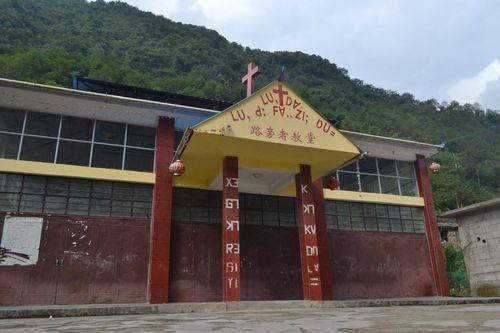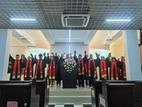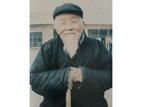Fugong is a poverty-stricken town on Yun's border with a majority Lisu population, but with Nu, Bai, and other minorities. The Lisu used to believe in primitive animism religion. Over 100 years ago, Fugong became a famous "Gospel County" with the arrival of western missionaries like James Outram Fraser and Allyn B. Cooke. They founded churches, translated the Bible and hymns into the Lisu language, and integrated the Gospel into the life and culture of native Lisu people.
Pastor Li Guihua, former chairman of the Fugong TSPM, once said that Christians accounted for 70% of the entire population, but in the rural areas the percentage was as high as 90%, and almost every household believed in Jesus.
In the 1940s or 1950s, when missionaries were expelled from China, the congregations in Fugong started to organize services, but a few years later church activities were suspended due to political factors. The Bible and hymnals were burned. It wasn't until China implemented the policy of freedom of religious belief in 1978 that the church in Fugong started to develop.
In the early days, the congregation held services at a preacher's home. Afterward, a thatched cottage was built as a chapel. "We had religious freedom, but no Bible." Rev. Sang Lusi, a former president of the Fugong Christian Council.
In around 1980, Rev. Sang and Rev. Joshua, who grew up as an orphan adopted by foreign missionaries, got approval from the local authorities to publish the Lisu version of the Bible and hymnals. "From 1927 to 1956, the whole county had only 50 or 60 churches. After reform and opening up, more churches were built to the extent that almost every unincorporated village had one church." Believers were active in donating funds to church construction and helping with building projects.
Meanwhile, the local church has been exploring ways to combine the Gospel with its ethnic customs. It has formed a worship and praise style of singing and dancing, hosting services and delivering sermons in their local dialects, and celebrating Thanksgiving during the autumn harvest. Rules have been made to ban drinking among Lisu believers who used to drink a lot and set up regular service times. On the whole, the Christian faith has been integrated into the daily life of local Lisu minorities.
Regarding the pastoral staff, their quality has been improved. Some of them can be admitted into seminaries like the national Nanjing Union Theological Seminary and the provincial Yunnan Theological Seminary. A Christian training center has been established in the county to cultivate Lisu preachers. The center teaches the Bible, launches training for women's ministry and pastoral workers, and invites officials and teachers to publicize regulations and anti-drug and AIDS prevention knowledge. Moreover, it holds training for believers to master skills like planting and medical skills.
In 2015, the code on the Christianity in Fugong was issued. Di Youtang, chairman of the CCC&TSPM of Fugong County, said, "The rural church is relatively unsophisticated in contrast to the urban church and still encounters all kinds of issues that are sometimes beyond imagination."
Another reason for the establishment of the code was that several missionaries who belonged to different denominations left different rules in villages of Fugong.
Consisting of 22 articles, the new code covers the foundation of the Christian faith, clerical duties, the administration and supervision of church councils, election system, grant system for pastoral workers, and regulations on church meetings and finance, etc. It also presents a local Lisu feature by prohibiting Christians from smoking, drinking and having fermented fruit juice and setting the celebrations of Easter, Thanksgiving, and Christmas within four days.
In addition, the church exhorts the congregation to apply their faith to their daily life.
In 2017, the county CCC&TSPM released an initiative to encourage believers to focus on sanitation in their regular lives in order to improve the living conditions and better glorify God as well as benefit people. It also called on the congregation to promote their awareness of the importance of personal, household, church, and village environmental hygiene.
On the other hand, the local church faces a challenge of ritualized faith. In the minds of many believers, all that they need to do about faith is to attend church activities, but they don't know the truth.
Di shared that the Lisu believers had a simple faith that they could be saved by resting on Sundays without drinking, smoking, and wrongdoing. However, the church gives a teaching that one who has superficial faith without inner piety cannot be saved. "With the social progress in recent years, some heresies from the outside enter here, affecting the church in Fugong. In the past, people had poor discernment of heresies even if they were pastoral workers, but the situation has been changed."
Di added that the congregation was undergoing a process of knowing the faith all over again. Before Christmas 2016, the speakers, including pastors, elders, and preachers were required to attend a specific training before preaching on the holiday.
Before the arrival of Easter, Thanksgiving, and Christmas, the county CCC&TSPM arranged its workers to write sermon outlines in turns and then conducted training for all the speakers across the county. This changed the phenomenon that believers preferred to attend services whose sermons were relatively good on Christmas.
Besides, there was no teaching about tithes ever since the missionaries served here. But for nearly two years, the pastoral staff has been exhorting the congregation to give tithes. "Now we start changing based on the Bible and make tithing as a part of the code. People who don't make tithes are not allowed to serve in the church because if a church leader doesn't give tithes, believers are less likely to obey it."
Di also said that the pastoral staff was partly supported by local believers because a preacher was paid 3,000 yuan a year due to the local rough economy. Well, it was a good thing that preachers who worked hard were backed by their wives and given warm receptions like meals and accommodation by believers. The believers also donated pigs and chicken to the church.
- Translated by Karen Luo














